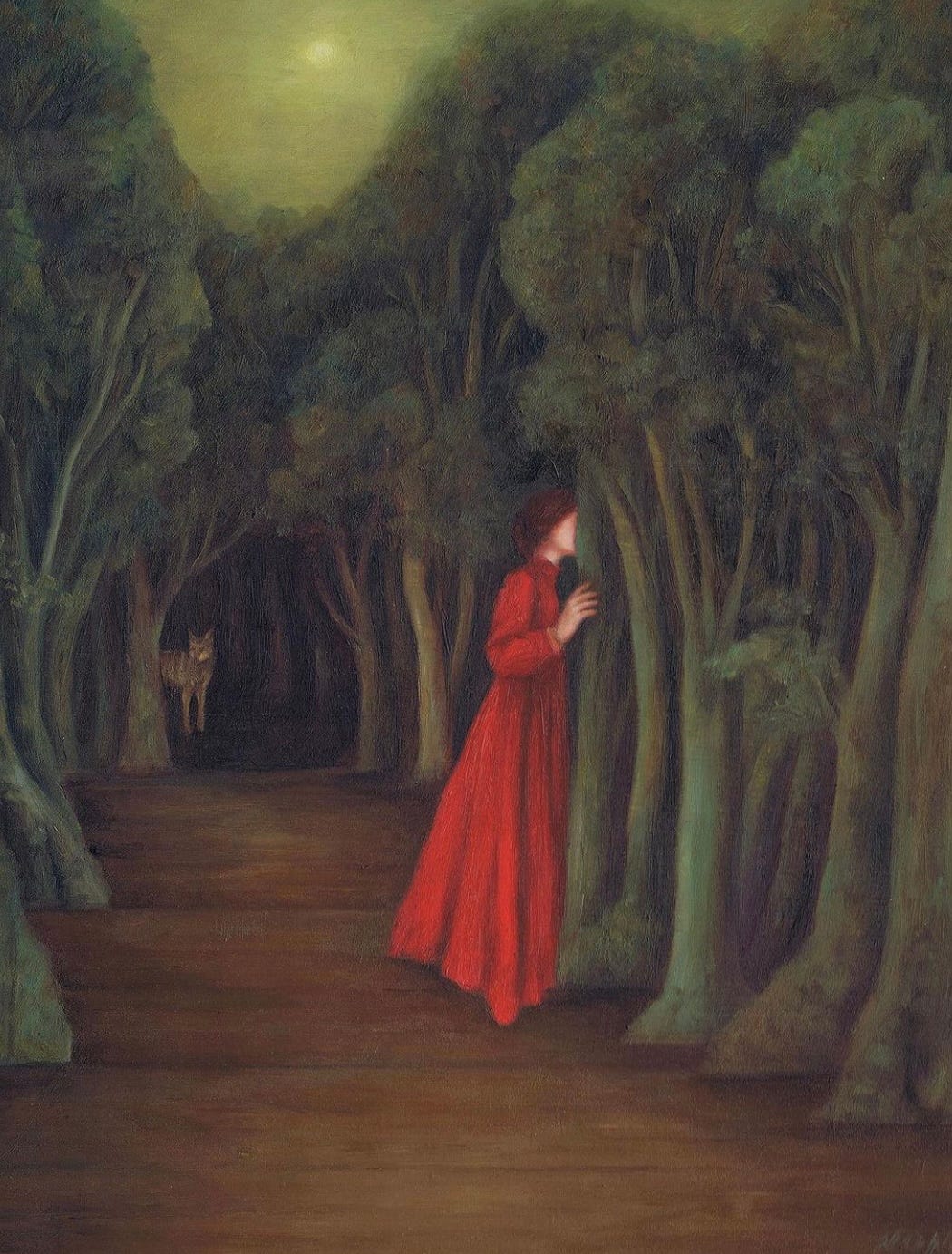Perhaps the biggest losses of the Gregorian calendar and modern, Christian, colonial, linear senses of time are that they forget the ways time and space are woven together.
Grief can remind us not only of time’s cyclicality, but of times’ embeddedness in place, in bodies: of flesh, of land, in enmeshed ecosystems, in relationship with others.
For most of human history, humans kept time by attuning their senses to place: observing, listening to, and consulting with bodies– celestial and earthly. Attunement to the placements of the sun and moon, the stars, the presence and life stages of other beings (the plants growing, fruiting, dying, the animals and their activity that season), and their own bodies was central. Keeping time was a sensuous, relational, and place based affair.
In his book The Spell of the Sensuous, sleight-of-hand magician, ecologist, and philosopher David Abram writes:
“The senses of an oral people are still attuned to the land around them, still conversant with the expressive speech of the winds and the forest birds, still participant with the sensuous cosmos. Time, in such a world, is not separable from the circular life of the sun and the moon, from the cycling of the seasons, the death and rebirth of the animals- from the eternal return of the greening earth.”
And through this kind of time keeping, humans are not only attuned to our present ecologies, but to those who came before us, and to those who come after. As Danica Boyce shares,
“Seasonal folklore & festivals call us back into community with all beings on the earth, with its regular spinning wheel of life and death, and help us to tend, through ritual, the ties we have to our kin of all species, both our ancestral kin, and our kin in the future to come.” (Dawn Rising: April Almanac).
The colonial process of imposing a new shape of time was directly connected to the violence of displacing people from their homes and land they belonged to. Our displacement from place and time are connected and happen through the standardization of linear, capitalist stories about time.
In her book Pagan Survivals, Superstitions, and Popular Cultures, Bernadette Filotas shares:
"Among the pre-Christian peoples of Western Europe as elsewhere, the most important festivals of the year were associated with the lunar and solar calendars. With the cycle of the birth, growth, death and rebirth of nature. Fertility and good fortune were guaranteed by rites designed to propitiate the forces of nature at the beginning and end of the growing and campaigning season; at the beginning of open pasturage at planting, harvest, and storage at the solstice and above all at the new year. These rites included sacrifices, expiratory offerings, observation of presages [that's like divination] sympathetic magic, and feasting. Both the cyclical concept of time and the very character of the rituals were deeply offensive to the church…To pre-Christian agrarian mentality however, time was the measure of nature and determined natural processes. Like nature itself, it was to be worshiped.”
Jenny Odell talks about the way time and capitalist extraction have been linked in colonialism as it spread throughout the world:
“colonists who would show up in a new area would see everything there, including the people living there, as being outside of time, outside of historical time… And that is the mindset behind extraction, and it still is, right? That that part of the world is inert and it doesn’t exist in time with us.” (Another Kind of Time)
And today, we see how these capitalist and colonial understandings of linear time and the inertness of the world continue to play out in disastrous ways, and our seasons themselves disrupted, shapeshifting quickly. David Abram shares: “Climate change is the simple consequence of forgetting the holiness of this mysterium in which we’re bodily immersed.” (The Ecology of Perception)
Today, under capitalism, there is so much grief connected to our experience of time. So many of us live with the dread of living in “end times”. So many of us are in despair, finding it hard to imagine living futures from within the ruins of massive ecological loss and state violence. And yet we rush around from thing to thing. Our grief is compounded because time feels scarce and our experience of it is mostly about not feeling, not attuning. It often feels like there “is no time to grieve”, as we are forced to continue business as usual, move on, numb ourselves, distract ourselves, and go back to work, even as business as usual continues to drive more violence and loss.
But what if our grieving could actually be part of disrupting all this?
Yoalli Rodriguez shares about the ways that grief disrupts colonially imposed understandings of time:
"I feel that grief is basically another ontological form of time…It is a politics of refusal to an imposed time that doesn't allow us time to feel…you are also being fugitive from these modern impositions of only thinking or centering the rational of the human.... & I think that when you connect to spiritual life, to feelings…you are also being a fugitive of these capitalist, colonial impositions.” (Grief as an ontological form of time)
And Josh Shrei, in his magical course Singing the World to Be with Piea Luzzi, shared with us:
“The entire structure is built upon not stopping and feeling. So lament is resistance. Aligning to the time it takes nature to restore. Aligning to the time that things within natural cycles take, and honoring that part of the cycle that says I can’t control this on my own and I can’t do this on my own and I don’t have all the answers and all I can do great mother is cry your name aloud again.”
Grief Magic is an experiment in allowing ourselves to stop and feel, to be time travelers and fugitives in time together, to attempt together to build a muscle for moving through time while being attuned to the world and ourselves – to not hurry one another along, to create a space for slowing down and orienting to ourselves and the world (and worlds) around us.
This is an excerpt from the Grief Magic Course! See details below!
GRIEF MAGIC: TIMEBENDING, SHAPESHIFTING, AND BECOMING MULTITUDES
Self paced Study
Grief Magic Self Paced Study is a year long course exploring themes around grief, magic, creativity, and shapeshifting in tune with the seasons.
WHAT’S INCLUDED IN THE SELF PACED STUDY:
Each season, you’ll receive:
Recordings of bonus workshops with guest instructors
An audio recording and PDF summary handout of seasonal/ ecological stories and inspiration for grief and creative process
A PDF of with creative prompts drawing inspiration from each season
A PDF guide to a grief ritual or practice inspired by the season
A PDF list of additional resources
Access to a discord specifically for other self paced study participants
Additional bonus recordings of exercises and materials released throughout the year
*There are 6 seasons included in the course, beginning in April 2024 and moving through March 2025 - see the main Grief Magic course page for a more detailed outline of seasonal themes.
Cost - $30 per month for 12 months
Article Sources
Abram, D. (1996). The Spell of the Sensuous: Perception and Language in a More-Than-Human World (1st edition). Pantheon.
Boyce, D. (2023, March 30). Dawn Rising: April Almanac.
Emergence Magazine. (2023, April 25). Another Kind of Time – with Jenny Odell. Retrieved April 2, 2024, from https://emergencemagazine.org/interview/another-kind-of-time/
Emergence Magazine. (2020, July 20). The Ecology of Perception – David Abram. Retrieved April 2, 2024, from https://emergencemagazine.org/interview/the-ecology-of-perception/
Filotas. (2005). Pagan Survivals, Superstitions, Popular Cultures. Pontifical Institute of Mediaeval Studies.
London, S. (n.d.). The Ecology of Magic – An Interview with David Abram. Retrieved April 2, 2024, from https://scott.london/interviews/abram.html
Odell, J. (2023). Saving Time: Discovering a Life Beyond the Clock. Random House.
Resilience. (2023, June 27). Coming to Our Animal Senses: A Conversation with David Abram. Resilience. https://www.resilience.org/stories/2023-06-27/coming-to-our-animal-senses-a-conversation-with-david-abram/
Shrei, Josh, & Luzzi, Peia. (2023). Singing the World to Be. Tapta Marg Productions. Retrieved April 2, 2024, from https://tapta-marg-productions.square.site/product/singing-the-world-to-be-with-josh-schrei-and-peia/40
Young, A. (2022, May 4). Dr. BAYO AKOMOLAFE on Slowing Down in Urgent Times. Retrieved April 2, 2024, from https://forthewild.world/podcast-transcripts/dr-bayo-akomolafe-on-slowing-down-in-urgent-times-encore-285
Young, A. (2022, September 28). YOALLI RODRIGUEZ on Grief as an Ontological Form of Time. Retrieved April 2, 2024, from https://forthewild.world/listen/yoalli-rodriguez-on-grief-as-an-ontological-form-of-time-306





